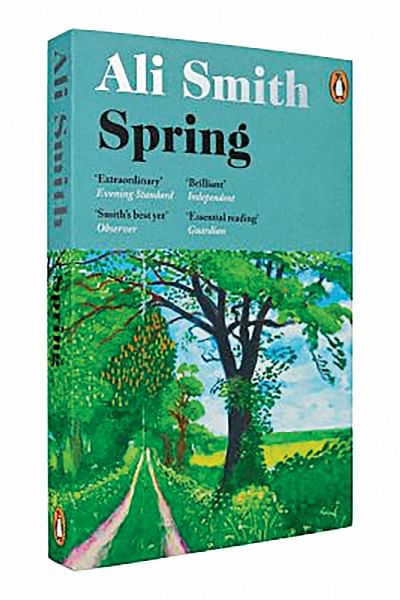Hope springs eternal

It would be easy to take a brief look at Ali Smith's oeuvre and think she is just one of those authors the literary establishment loves. She after all has four Booker shortlisted novels under her belt. For one, she writes about the big and complex issues, not only engaging in politics, but also making it a central concern in her work. It wouldn't be too far off to say that her books even have a political agenda. The ones of her that I've read—and I've read nine thus far—have major thematic overlaps, share sensibilities and a similar style of formally inventive and experimental prose. All of these are pushed to their height in her delightful seasonal quartet—a series of four books, each cycling around a season; written as a response to the time she had been living in.
Spring (Penguin Random House, 2019), the third instalment of the quartet, sees the natural and the political world bloom into life. The book introduces two narratives. The year is 2018. Richard, a screenwriter, boards a train to Scotland, in an attempt to deal with the emotional turmoil over losing his best friend and collaborator Paddy. He has been recently assigned to adapt a film about the coincidental but unbeknownst to the authors, stay of Rainer Maria Rilke and Katherine Mansfield's at an inn in Switzerland in 1920. His director wants the film to be a sexed up rom-com. Paddy instead encourages him to dig into the works of these authors, in particular Mansfield's. The other narrative thread involves Brittany, or Brit, as she is called (notice the pun), an intelligent but working class woman who works at an Immigration Detainee Centre. She and her colleagues play linguistic games at the office to make their work seem less barbaric. She hears a rumour about a twelve-year-old school girl walking into the facility, seemingly invisible to the security, and has been able to shame the people in charge to deep clean the toilets. Brit meets her one day on her way to work, and finds out that the girl is named Florence and Florence persuades her to abandon work and take a trip to Scotland against her will and political instinct. The two narratives converge and the characters take a road trip towards the end.
As with all the other books of the series, this one too, to this reader's delight, is light on plot, heavy on the possibility of language and how they amplify our experiences and sometimes defend against them. The first quarter of the book reads as extreme sport: there is such swift and deliberate control of information, under the guise of puns—a literary device Smith is notorious for. But they never get in the way of the playfulness of her prose. I'm reading accounts of the refugee crisis, climate change, border crossings, family dysfunction, migrant detention, rise of nationalistic authoritarianism, but the seriousness of these issues are never eclipsed by the joy with which she writes about them. Brexit and the change it brought to everyday life is a recurring motif throughout the book and there does not seem to be any shortage of nastiness in the wake of the Western world taking a gradual rightward shift. But there is also no cessation of hope; the novel brims with almost Disney like optimism for the future. The monstrosity of now will pass, Smith writes, "It'll melt away, like snow in May."
Spring is also the most political of the first three books of the series. Florence at one point talks about the re-imagination of borders—instead of them being a place of division, an artificial structure to keep people away from each other, they can be transformed into a place of unity, where people become "doubly possible". Highbrow elite literary fiction doesn't have any place for conservative ideas. Even when they are talked about, they are rarely treated seriously. But Smith instils these ideas to clearly intelligent characters, and then slowly deconstructs them over the course of the pages.
Spring is rife with art. "Now what we don't want is facts" says the book in its opening paragraph; an homage to Dickens' Hard Times which goes on for the next few pages, without ever skipping a beat. Her workings of Dickens' passages in the seasonal quartet are some of the most arresting beginnings of any book I have ever read. They are loud and almost violent proclamations of the general state of the world, and also what not to aspire to. There is of course a subtle nod to Shakespeare, Pericles: Prince of Tyre. There is the art work of British artist Tacita Dean. In a lesser writer's hands, these would appear as name drops or the writer waxing their supposed wealth of knowledge. But in Smith's they become something more than plot devices.
Sally Rooney once said in an interview that books are just entertainment, aesthetic objects of decoration in the time of historical crisis. Ali Smith's seasonal quartet, if anything, is a great rebuttal to that kind of dangerous sentiment. Especially with Spring—a luminous novel of infinite imagination, a big heart, and fierce purpose.
Minhaz Muhammad is a contributor.
Read this article online on The Daily Star website, on facebook.com/dailystarbooks, @thedailystarbooks on Instagram, and @DailyStarBooks on Twitter.

 For all latest news, follow The Daily Star's Google News channel.
For all latest news, follow The Daily Star's Google News channel. 



Comments